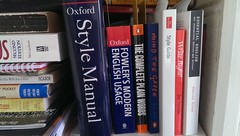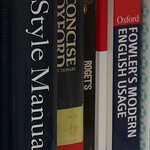Just because I love technology and spend a lot of time on the web, and writing for the web, doesn’t mean I’ve eschewed books.
Read MoreA few of my reference books

reference books
Just because I love technology and spend a lot of time on the web, and writing for the web, doesn’t mean I’ve eschewed books.
Read MoreThis book may be thirty years old, but its advice is still pertinent. If you want to have a blitz or crackdown against, or shake-up of, bad writing (all examples of 'tabloidese'), then this is the book for you.
Read MoreI’ve been enjoying delving into the meaning of some of the expressions we come across all the time — and a few we don’t.
Read More
Lexico website, by Terry Freedman
Could this website be a substitute for a printed usage guide?
Read MoreThere are two broad kinds of style guide. There is the generic type, containing advice on such things as whether to use “different from” or “different than”. And there is the specific type, ie specific to a particular publication. For example, should “internet” be spelled with a lower case “i”, or as “Internet”?. The specific style guide will tell you.
Read More
Collins Complete Writing Guide
Should this book be in the reference section of your bookshelf, or is too lighthearted? Here’s my verdict.
Read More
The Business of Being a Writer
What does this book cover, and is it suitable for writers not based in the USA?
Read MoreThis book may be thirty years old, but its advice is still pertinent. If you want to have a blitz or crackdown against, or shake-up of, bad writing (all examples of 'tabloidese'), then this is the book for you.
Read More Books of quotations are important, I think, for those odd occasions you need to have one. And that phrase “odd occasions” is the rub: do you actually need to buy a reference book for occasional use when there is so much available on the web these days?
Books of quotations are important, I think, for those odd occasions you need to have one. And that phrase “odd occasions” is the rub: do you actually need to buy a reference book for occasional use when there is so much available on the web these days? There are two broad kinds of style guide. There is the generic type, containing advice on such things as whether to use “different from” or “different than”. And there is the specific type, ie specific to a particular publication. For example, should “internet” be spelled with a lower case “i”, or as “Internet”?. The specific style guide will tell you.
There are two broad kinds of style guide. There is the generic type, containing advice on such things as whether to use “different from” or “different than”. And there is the specific type, ie specific to a particular publication. For example, should “internet” be spelled with a lower case “i”, or as “Internet”?. The specific style guide will tell you.
You need both types, of course, but unfortunately it’s not quite as simple as your needing only two books or two documents.
Before anyone tells me that the plural of “thesaurus” should “thesauri” rather than “thesauruses”, which is what I’d have thought myself, apparently it can be either, according to the Oxford dictionary.
I find a thesaurus to be indispensable on those occasions when the most appropriate word is on the tip of my tongue,
 If you are going to put together a Reference Toolkit, having been convinced by my article A writer’s Reference toolkit: Why?, what should be included?
If you are going to put together a Reference Toolkit, having been convinced by my article A writer’s Reference toolkit: Why?, what should be included? A couple of years ago I wrote an article called Some of my reference books, which described some of the reference books I use, and why. Two years on, I thought it would be interesting to revisit this subject, but in a little more depth.
A couple of years ago I wrote an article called Some of my reference books, which described some of the reference books I use, and why. Two years on, I thought it would be interesting to revisit this subject, but in a little more depth. Just because I love technology and spend a lot of time on the web, and writing for the web, doesn’t mean I’ve eschewed books. I still use books extensively (and intensively) for my writing. Not any books either, but ones written or contributed to by experts.
Just because I love technology and spend a lot of time on the web, and writing for the web, doesn’t mean I’ve eschewed books. I still use books extensively (and intensively) for my writing. Not any books either, but ones written or contributed to by experts.
I think if you’re serious about writing you don’t want to be messing about with so-called “crowd-sourced” information, which may or may not be correct.